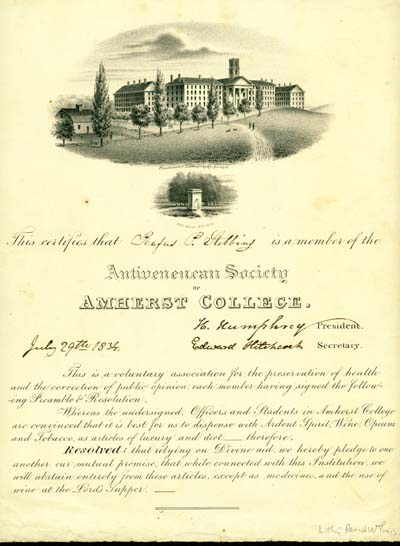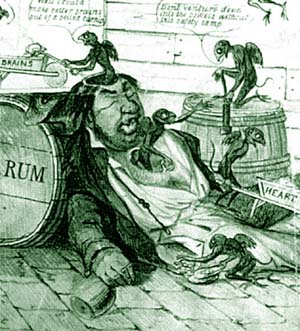The Temperance Movement
The argument for an alcohol free America has been fought from colonial times until it was ultimately won with the ratification of Prohibition. The main argument was that alcohol took men away from their families creating poverty and broken families. Religious reasons were used in the argument to create a wider audience. During the Second Great Awakening over one million Americans, mostly evangelical Christians signed the "Temperance Pledge." A pledge to abstain from alcohol completely.

Temperance aimed to stop the degradation of the family by alcohol. The reformers believed that without alcohol there would be no prostitution, more perfect marriages, and better men throughout the country. Their beliefs turned into a sustained social movement reemerging in the 1870s, from a fear of the power of the United States Brewers' Association which conducted all its publications and meetings in German.

The Temperance movement failed so many times because the people of America, whether of Irish, German, Czech or English descent, used alcohol in many of their cultural traditions. It was part of the American identity. As public drunkenness became more prevalent and the Second Great Awakening gained more followers the strength of the Temperance Movement grew. Many Americans still viewed brewed beverages as a safer alternative to water, this made it difficult for people to join the movement without a safe alternative to water. The proponents of prohibition of alcohol realized this and focused their efforts on banning high alcohol content beverages such as fermented wines, whisky and other spirits, beer vendors joined the fight against the distilled liquors. This was the biggest mistake the beer barons could have made because to agree that there is an inherent problem with liquor can only strengthen the argument of the Temperance Movement.
Women of the movement took to teaching the evils of alcohol in schools, in churches, and on the street to anyone who would listen. They attempted to enter saloons, taverns and beer gardens to preach to the inhabitants about the curses of booze. Shopkeepers were known to let them in and pour beer on them sending them into the freezing streets,one beer garden owner even propped up a canon at the entrance warning the women to stay away or be blow to pieces, one brave (or crazy) women mounted the canon and began singing hymns and was joined by several more until the beer garden owner was forced to let them enter.
The start of World War I changed the opinion of beer as a wholesome drink to a beverage equally as destructive as distilled spirits due to beer's humble beginnings in Bavaria. The major breweries of America were almost exclusively owned and operated by German-American Companies. The choice of the United States Brewers' Association to be so blatantly German as Anti-German sentiment soared after America entered the war paved the way for the 18th Amendment to become law on January 16th 1919. Beer was considered German and all things German were made Anti-American by President Wilson's Committee on Public Information. Beer gardens were closed by the same day one year later, only reemerging in the 1960s.